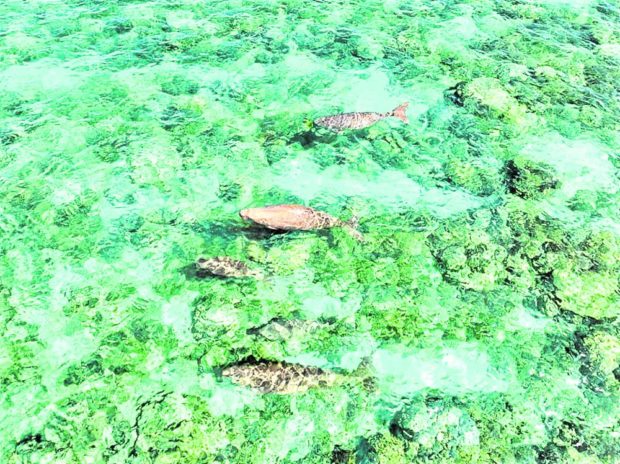Rare ‘Party of 5’ sea cows spotted in Sarangani Bay

GENTLE GIANT | Five sea cows or dugong were sighted by environmentalists off Sarangani Bay foraging for food in this photo taken on March 11, 2022, —PHOTO COURTESY OF DEPARTMENT OF ENVIRONMENT AND NATURAL RESOURCES REGION 12
KORONADAL CITY, South Cotabato, Philippines — Environmentalists have reported the sighting of five sea cows, commonly known as dugong, off Sarangani Bay looking for food.
The sea mammals were spotted by the drone camera used by the Sarangani Bay Protected Seascape (SBPS) Protected Area Management Office, as they were foraging off the coast of Glan town in Sarangani on Friday.
Ma. Elvira Lumayag, the provincial environment and natural resources officer, said it was the first time in recent memory that “a herd of five” dugong was sighted in the bay. Normally, she said, only a solitary sea cow or a pair could be seen.
‘Efforts paying off’
The Department of Environment and Natural Resources (DENR) conducts a monthly monitoring of marine mammal activity in the bay in line with conservation and protection efforts.
“This sighting is a manifestation of how we are taking care of our protected seascape. Our efforts are paying off,” Lumayag said.
Known for being shy and mainly subsisting on seagrass, the dugong are considered the flagship species of Sarangani Bay.
“We’re glad that we still have this number of dugong [here],” SBPS supeintendent Joy Oloquin said. “We thought we were losing this species because we were considered a hot spot [for these animals]. We are delighted to see them.”
The DENR office in Region 12 cited reports of dwindling dugong population in other countries due to habitat loss and industrialization, as monitored by the International Union for Conservation of Nature and the World Wildlife Fund.
DENR needs help
For DENR-12 director Felix Alicer, the recent dugong sighting in Sarangani showed that the SBPS require continued protection, not only by the DENR but by other stakeholders.
“The DENR alone cannot carry out its functions effectively without the support of the citizenry and the local government units. We must all work together to protect and preserve the biodiversity in the SBPS,” said Alicer, who also chairs the SBPS Protected Area Management Board.
Protected area
According to marine biologist Roy Operario Mejorada of the Environmental Conservation and Protection Center-Sarangani Province, the sea cows showed up just as the SBPS was marking its 26th anniversary.
“Not just one dugong, but five! The herd was foraging on the seagrass meadows and mothers were observed nursing the calves. This sighting is just one of the many reasons why we protect our bay,” Mejorada wrote on social media.
The SBPS was established in 1996 through Proclamation No. 756 signed by then President Fidel Ramos.
The protected area comprises the entire Sarangani Bay and a portion of the municipal waters of Maitum, Kiamba and Maasim towns.
RELATED STORIES
Women power in Sarangani Bay keeps coral predators away
Rough-toothed dolphins seen for first time in Sarangani Bay
Dolphin sightings prove Sarangani Bay is healthy –environment execs